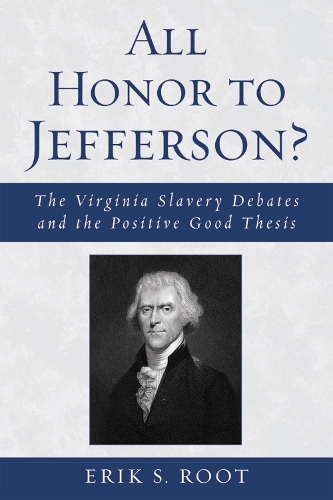
All Honor to Jefferson: The Virginia Slavery Debates and the Positive Good Thesis
(Paperback)
Publishing Details
All Honor to Jefferson: The Virginia Slavery Debates and the Positive Good Thesis
By (Author) Erik S. Root
Bloomsbury Publishing PLC
Lexington Books
8th February 2008
United States
Classifications
Tertiary Education
Non Fiction
Slavery, enslaved persons and abolition of slavery
973.46
Physical Properties
Paperback
264
Width 153mm, Height 229mm, Spine 21mm
399g
Description
VirginiaOs most prominent statesman had a profound influence on the American Founding. Of the first five presidents elected, four of them were Virginians. Old Dominion thus held an influential position in the Union. The Founders held a reluctant tolerance of slavery, yet every leading Founder believed that slavery was wrong. They based this argument on the natural rights all men, all humans, possessed. With a natural rights understanding of the American Founding, it is an inescapable conclusion that slavery is a violation of those rights. However, the Founders expressed their distaste of the peculiar institution in different ways. All wrote privately about their aversion of the institution, and some took unmistakable public positions. Several also found ways to demonstrate implicitly their opinion about slavery. Because of its influential position, the political direction of Old Dominion was a bellwether for the Union. During the 1829-1832, in two instances, Virginians debated the future of slavery in their state. First, in the Constitutional Convention in 1829-30 they debated the existence of natural rights and whether those rights were a guide for statesmanship. During this convention there was an attack on natural rights that set the stage for the next great deliberation over slavery. Second, they explicitly discussed ending slavery in the House of Delegates after the Nat Turner insurrection in 1831-32. The Delegates of the day rejected the emancipation of the slaves as a moral and political necessity. Virginians had the opportunity to place slavery on the road to gradual extinction. They had an opportunity to reaffirm the principles of liberty, but ultimately that argument lost. The forces of self-interest defeated those who articulated the principles of the Declaration of Independence. This was solidified when Thomas Roderick Dew wrote his review of the debates in the House of Delegates. As a result of his arguments, the pro-slavery argument proceeded apace in Virginia with Dew being instrumental in the development of the Opositive goodO thesis.
Reviews
This is a fine study. Root finds in the Virginia slavery debates a prelude to Calhouns positive good theory of slavery. Of particular note is Roots solid understanding of political philosophy, a virtue usually missing in contemporary histories. In revealing the character of the defense of slavery in the young nations most important state, Root sheds valuable light on the tragic decline of moral and political principle in antebellum America. -- Scot Zentner, professor of political science at California State University, San Bernandino
Root provides an effective discussion of the arguments over slavery in Virginia. -- Phillip Hamilton * Journal of American History *
Root's work is suggestive of the power of natural rights philosophy and its use (and abuse) by early republican Virginians. * Southern Historical Association *
Root convincingly defends the honor of America's Founders on the vexed question of slavery. He shows that it was the abandonment of the founding principles, not their fulfillment, that led Virginia and the South to embrace the cause of slavery as a positive good. I have never read a more convincing treatment, backed up with detailed discussions of major politicians and writers, of this transformation of opinion in Virginia. Root captures well the sincerity of the anti-slavery men, their soul-wrenching agony and perplexity over what to do about it, and the final disgraceful capitulation of post-1830 Virginians to the forces, intellectual and practical, that demanded the rejection of the idea that all human beings have a natural right to liberty. -- Thomas West, professor of politics at the University of Dallas, senior fellow at the Claremont Institute, and author ofVindicating the Founde
Author Bio
Erik S. Root is assistant professor of political science at West Liberty State College.
